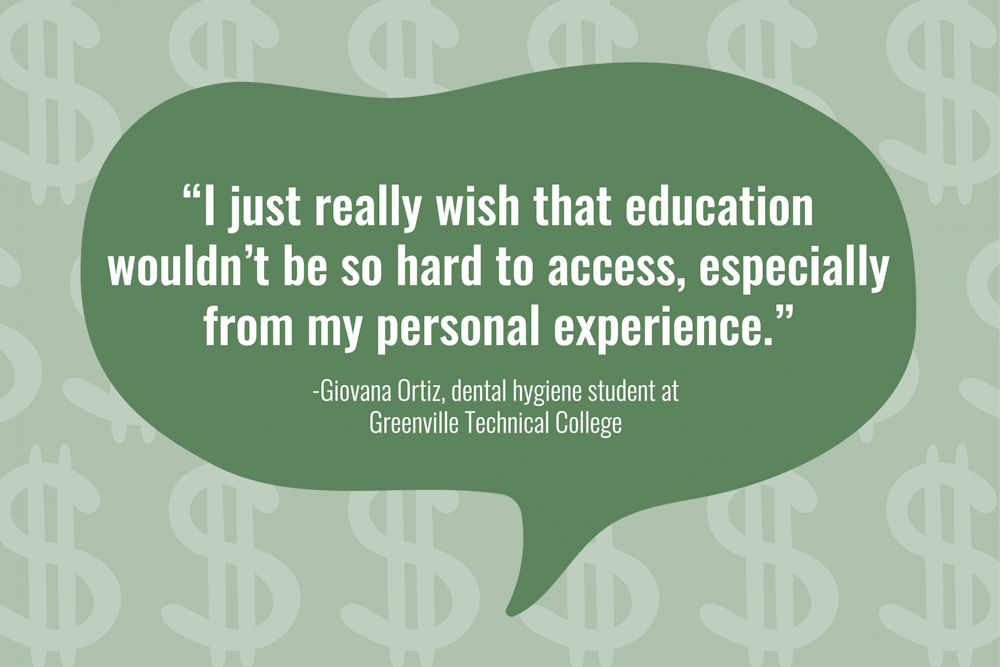Students largely agree that the cost of college is both too high and that it limits people’s opportunities. Many also said government-funded higher education would put them more at ease while pursuing a college degree.
“I just really wish that education wouldn't be so hard to access, especially from my personal experience,” said Giovana Ortiz, a dental hygiene student at Greenville Technical College. “I've struggled a lot to get education, so the fact that I'm doing it makes me feel great, but I feel that if I had more resources, it would be a weight off my shoulder.”
Many students said they didn’t think the high price of college — between tuition, fees and materials — was justifiable.
“It was kind of an eye-opening experience to see the different dollar figures on all the different schools,” said Caroline McDonald, a first-year international business student. “I’m not sure that should be that expensive.”
McDonald said she is the first person in her family to apply for college, so she was surprised by the cost.
Many students said not having a college degree keeps people from obtaining high-paying jobs.
“So you shouldn't be having to spend out the nose for hundreds of thousands of dollars in debt, to then go get a job to maybe someday pay that off,” said Stephen Hilton, a fourth-year aerospace engineering student.
Hilton also said college has become as much of a necessity for well-paying jobs as a high school diploma.
Many students said college costs should be covered by the individual student, their family, scholarships and government aid. In other words, the way it is today.
However, many also said the government should bear all or a more significant portion of the cost of higher education.
Drew Gatch, a graduate student studying business, said he hoped the U.S. would model itself after European countries with free college to give more people the opportunity to attend college.
“As far as how quickly we can do that, I’m not totally sure,” Gatch said.
Many students who thought the government should provide free higher education said the price makes college incredibly difficult for lower-income individuals to afford. Some spoke from personal experience.
“Considering the fact that the average person wouldn't survive a $400 bill just being thrown at them, you know, how do you expect people to pay like ten grand every year for college?” Amauria Covington, a third-year psychology and first-generation college student, said. “It just, it rubs me the wrong way that they really just don't want us to be here because we can't pay for it.”
Covington said the government should cover all student’s costs.
Others said college should be paid for mainly or entirely by the individual student.
Free, government-provided college would encourage more students to go to college than need to while burdening taxpayers, said Mia Bialecki, a first-year biomedical engineering student.
“I don't think that's fair on other people,” Bialecki said. “In the future, I would be paying for other people to go to college instead of paying for myself.”
Many of the students who opposed universal government-provided college said offering free college would devalue a diploma and would take away an important incentive to work hard.
Others didn’t feel the same way, though.
“I think I would be more inclined to do better because I feel like then I'm doing it on my own time and what I really want, rather than when I'm being forced, I guess, into doing,” said Sophie Simpson, a first-year biology student.
Not all students thought the issue of paying for school was a choice between the individual and the state. Some students, like Simpson and first-year psychology student Emily Kraus, said employers who require higher education should pay the individual's costs.
Leah Linder, a first-year history student, said she would feel less guilty about going to college if the government paid for it instead of her parents, both of whom are teachers.
Whether or not they saw higher education as an individual or societal responsibility, students generally said the cost of college makes it much harder for those who can’t afford it.
“I just feel like a lot of kids go into even like first grade and second grade thinking, like, ‘My parents didn't go to college because they're poor. So, I'm now poor. So, I'm not going to get a college education either,’” said Maddison Yates, a second-year elementary education student. “I think if they had the mindset that they could go to college, they would learn a lot more in school.”

